Protea flowers, SF Botanical Garden, Strybing Arboretum, Golden Gate Park
No major city can afford to lack a Botanical Garden and San Francisco has one in Golden Gate Park. The Botanical Garden at Strybing Arboretum specialises in mediterranean, mild temperate and tropical cloud-forest plants. Here Proteas, all the way from South Africa, bloom in Golden Gate Park.
Golden Gate Bridge from Lincoln Park
Lincoln Park was originally the site of the Golden Gate Cemetery, but in 1909 the land was handed over to the Parks Commission and they instigated work to clear the graves. This was not the first move for some ‘residents’ as the Golden Gate Cemetery was used to rebury remains from Yerba Buena Cemetery when it was cleared for the construction of City Hall. A three hole golf course had been built in 1902 and the clearing of the graves allowed the course to be expanded to a full 18 holes. In addition to the Municipal Golf Course, Lincoln Park is known for its magnificent views of the Golden Gate and the Pacific coastline.
Ruins of Sutro Baths
This isn’t a paddling pool by the Pacific Ocean, it was once the largest indoor swimming pool in the world. The Sutro Baths were built by by former San Francisco mayor Adolf Sutro and they opened in 1896. Costing over $1 million to build the baths covered and area of more than 1.2 hectares (3 acres) and held around 6.5 million litres (1.7 million US gallons) of sea water. The baths were not a commercial success and in the 1930s they were partly converted into an ice skating rink. In 1964 the site was bought by developers planning high rise apartments, but the remains of the baths burned down in 1966 and the plans were never implemented.
Japanese Tea Garden, Golden Gate Park
There are Japanese Tea Gardens in parks the length and breadth of the USA, but this is one of our favourites. The garden was built as a temporary exhibit for the 1894 California Midwinter Fair. Later Japanese landscape designer Makoto Hagiwara reconstructed it as a permanent garden within the park. The Hagiwara family lived in the Japanese Tea Garden and further developed it right up to 1942 when the US entered World War II and the family were sent to concentration camps. The garden fell into disrepair and many of the structures were demolished. Although Hagiwara’s garden is no more, the modern Tea Garden is well worth a visit.
Lands End & Golden Gate Park
The west of the peninsula is a complete contrast to the bustle of downtown San Francisco. Much of the area is parkland, Lincoln Park to the north with its views of the Golden Gate and in the south the Golden Gate Park, bigger even than New York’s Central Park. Between the two parks are mainly quiet residential streets.
Click on Minimap to navigate
Home > US States > The West > California > San Francisco >
Ocean Beach
The western end of Golden Gate Park is just a highway away from the beach. Near the left of the picture a windmill sail is just visible. This is a sail of the Dutch Windmill built in 1903 to pump water needed to irrigate the Golden Gate Park. The Dutch theme was expanded in 1962 with the addition of the Queen Wilhelmina Tulip Garden alongside the windmill, named after the late queen of the Netherlands. The windmill is no longer needed for irrigation but was restored in 1981. Click Tab 2 for a closer view of the Dutch Windmill.
Stow Lake, Golden Gate Park
Golden Gate Park is very big, 410 hectares (1013 acres) in total. This makes it a good 20% bigger than Central Park in New York. In response to popular demand for a park, in the 1860s the City Authorities set aside an are od wasteland to the west of the city. William Hammond Hall designed the park and in 1871 he became the first Park Superintendent. Stow Lake, shown here, is shaped like a ring doughnut as it was constructed around the summit of Strawberry Hill. The park offers much more than lakes and trees, it is also home to museums and several specialist gardens.
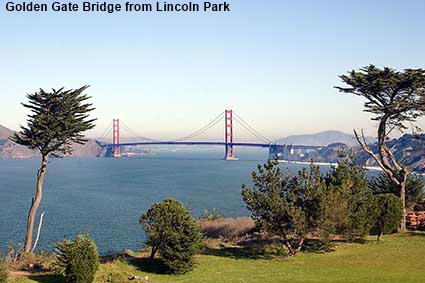

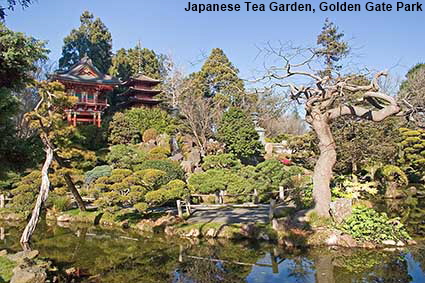

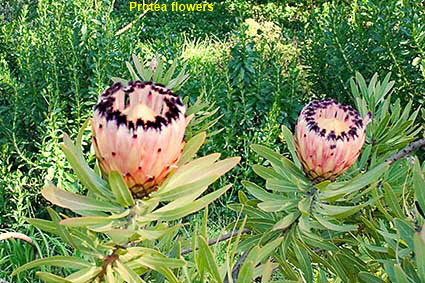
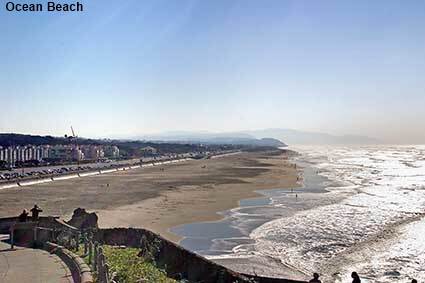


To move forwards or backwards through the San Francisco trail click the arrows above, or select your next destination on the Minimap.
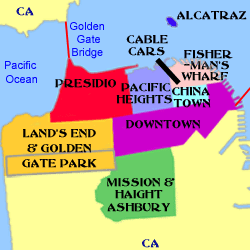
DLU070515

© Mike Elsden 1981 - 2025
The contents of this page may not be reproduced in full or in part without permission